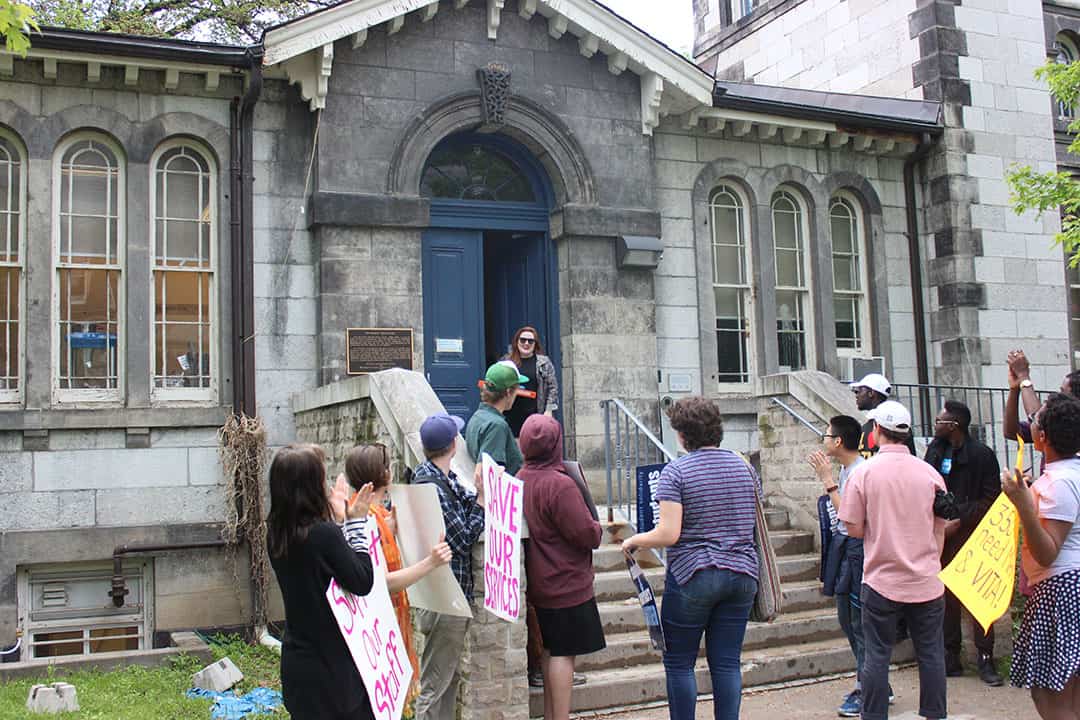Fifty thousand students under the scope of Health and Dental Plan Coordinator Maria Galvez. Hundreds of clubs interfacing with Clubs and Service Groups Coordinator Vita Carlino. 14 years of service between them. Yet it took six individuals only nine minutes to officially recommend laying off these two crucial UTSU staff members at a March 27 meeting of the Services Committee — a committee whose mandate is to represent the best interests of students.
Just how they determined students’ ‘best interests’ is a mystery, as none of the affected bodies were consulted. In fact, many concerned stakeholders only learned of the decision by poring over the agenda sent out before the March 31 Board of Directors meeting.
Despite this lack of transparency, students showed up at the March 31 meeting to voice their concerns, only to be met with an overwhelming stifling of discussion. Livestreaming of the meeting was initially prohibited by the board, denying average students the right to witness it. Mathias Memmel, then Vice-President Internal and Services, attempted to prohibit debate on the Service Committee minutes, only relenting under the objections of many present. Then, a mere 10 minutes was allotted to discuss the future of the two integral staff members. The board opposed a motion to further extend debate, leaving many concerned students with words unspoken and unheard, including then-UTMSU President Nour Alideeb.
It should be no surprise that the meeting, and subsequent ones, ended in chants of protest; this was the only means for neglected and concerned members to take a stance.
This level of concern is not surprising, given Galvez and Carlino’s crucial roles. Galvez has been a consistent support, filling the gaps that the relatively new UTSU health provider Studentcare has created for students. The help students receive in accessing and understanding their health and dental plans is crucial, especially given reports of Studentcare’s poor waiting times and lacklustre customer service at UTM.
Vita has helped support clubs and several levy groups such as the Sexual Education and Peer Support Centre and Downtown Legal Services. It is through clubs that students can be supported in small communities and engaged with the students’ union and the overall student movement, and these clubs require dedicated support. To put things in perspective, consider that the Mississauga campus hired a Clubs Coordinator to meet their needs — and the St. George campus has approximately three times as many clubs. To assume the St. George campus could manage without such a position is indicative of how out of touch with student needs the new UTSU executive is.
The UTSU claims that neither the Health and Dental Plan coverage nor the clubs and service groups funding will change. But what good is it for services to exist if there aren’t adequate resources to facilitate students understanding and accessing them in a timely, efficient manner?
Moreover, under section 5.02 of the collective agreement with CUPE 1281, the work provided by these two staff members cannot be sub-contracted out. This is a basic principle of job security and an important part of the UTSU’s responsibility to be a fair employer that supports stable, good-quality jobs for everyone, including its own staff. With the work of these two staff members essentially going unreplaced, the quality of services provided will surely suffer.
The saddest part is that it doesn’t have to be this way. We could have a students’ union with the vision to do more for students, not less. Imagine a UTSU running strong campaigns on the issues that matter most to students, such as tuition fees, affordable housing, and unemployment; a UTSU that engages with its members through regular outreach so that they are aware of what the union offers, and supports grassroots student activism in tangible ways. All of this is possible, but it requires a fundamental shift in the vision and strategy of the union, as well as the support of full-time staff to provide quality services.
The UTSU needs to grow from a small club for the privileged into a union that supports the most marginalized on campus. Without bold strides in this direction, incoming students at U of T might come to see the current executive’s austerity measures as the only option, and forget that something better is possible.
Many students on campus are concerned that Memmel is perpetuating the same elitist, self-serving “clique of student politicians” standard he vowed to dismantle. When members are left in the dark and then bullied out of discussions that directly affect them, everyone — regardless of how they may feel about the layoffs — should question just whose interests the UTSU has at heart. Students shouldn’t demand better, they should demand nothing but the best.
Amanda Harvey-Sánchez is an incoming fourth-year student at Trinity College studying Environmental Studies, Social Cultural Anthropology, and Equity Studies. She is the UTSU Social Sciences Director and a member of the Save our Services, Support our Staff campaign.
José Wilson is an incoming fifth-year student at UTM studying Accounting. He is the Vice-President External at the UTMSU and also serves as the UTM Designate on the UTSU Executive Committee.


